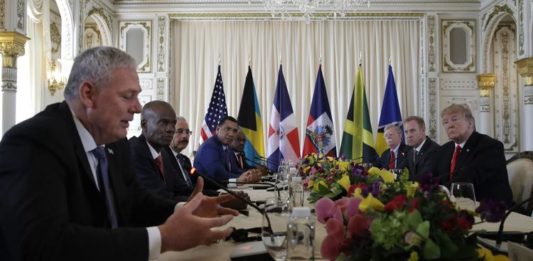Gang of Four CARICOM leaders criticised for meeting with US president
Get our headlines on WHATSAPP: 1) Save +1 (869) 665-9125 to your contact list. 2) Send a WhatsApp message to that number so we can add you 3) Send your news, photos/videos to times.caribbean@gmail.com

March 27, 20190

By Caribbean News Now contributor
BRIDGETOWN, Barbados – Several Caribbean Community (CARICOM) leaders have voiced their opposition to the March 22 meeting with US President Donald Trump and four of their colleague heads of government at Mar-a-Lago in Palm Beach, Florida.
Among those fuming over the four CARICOM leaders that discussed the intensifying political calamity in Venezuela is Prime Minister Dr Ralph Gonsalves of St Vincent and the Grenadines.
Attending the meeting with Trumps were Prime Minister Allen Chastanet of Saint Lucia, Prime Minister Dr Hubert Minnis of The Bahamas, Prime Minister Andrew Holness of Jamaica and President Jovenel Moise of Haiti, all CARICOM member states, along with President Danilo Medina of the Dominican Republic.
Over the weekend, Gonsalves was in Barbados for a LIAT shareholders’ meeting, and spoke to media concerning the Mar-a-Lago meeting, which he described as “troubling.”
Gonsalves added that the meeting was not in line with the agreed mechanisms recognised by CARICOM.
“These four prime ministers that have gone – clearly it’s not a CARICOM mission – and none of those governments can speak for anybody but themselves. Certainly, they can’t speak for CARICOM or St Vincent and the Grenadines.
“There was no true representation of CARICOM, as the current chairman of CARICOM, prime minister of St Kitts and Nevis, Dr Timothy Harris, was not invited to the meeting. Neither were the members of the CARICOM advisory committee comprising Barbados Prime Minister Mia Motley and Trinidadian Prime Minister Dr Keith Rowley.
“CARICOM has its own committee, comprising St Kitts and Nevis’ Prime Minister Dr Timothy Harris; prime minister of Trinidad and Tobago Dr Keith Rowley; and Mia Mottley, prime minister of Barbados, to spearhead dialogue on the crisis in the South American country.”
Gonsalves added that the regional bloc must be aware of “the mischief that some persons may be up to, to seek to divide us in a manner which we ought not to be divided and therefore reduce the extent of the efficacy of our work.”
Also taking issue with Trump’s meeting was Antigua and Barbuda Prime Minister Gaston Browne, who was asked whether the meeting signified diplomacy or bribery.
As details were emerging concerning the outcome of the Mar-a-Lago meeting, Browne launched a fiery attack on Facebook, stating:
“CARICOM must continue its sustaining position by standing on principle without inducements or fear of reprisals.
“I feel embarrassed for those weak-minded leaders who allowed themselves to be used by carrying out the agenda of others.”
One of the potential results of the meeting involving US investment drew the ire of Browne, and he stated that it was apparent that CARICOM’s solidarity is being undermined by those who are also determined to relegate the region to an object of history.
“The irony about all this, Overseas Private Investment Corporation (OPIC) is already operating in these countries, and China offers better credit terms: developmental loans over 20 years at 2 percent interest with a five-year moratorium,” Browne contended.
However, the immediate former chairman of CARICOM, Prime Minister Andrew Holness of Jamaica, is optimistic about US investment in the Caribbean region.
Holness expressed his enthusiasm, telling media in Florida that such a move was significant:
“The message from this meeting is that the United States wants to encourage and promote stronger relationships with the region. It’s absolutely important that it’s not just talk – that there will be real investment.”
Meanwhile, the foreign affairs minister for Jamaica, Kamina Johnson-Smith has made it clear that the only country that is part of the so-called Lima Group, which advocates regime change in Venezuela and which was represented at the closely watched meeting, is Saint Lucia. Johnson-Smith also sought to make it clear that Jamaica has not recognised Juan Guaidó as president of Venezuela.
CARICOM, Uruguay and Mexico have signed on to the Montevideo Mechanism, which promotes harmony and dialogue amongst the political coalitions in Venezuela. The CARICOM states have also acknowledged themselves as a region of peace – a concept that would be severely tested should the US decide to take military action against the current government in Venezuela.
Leave a comment
You must be logged in to post a comment.